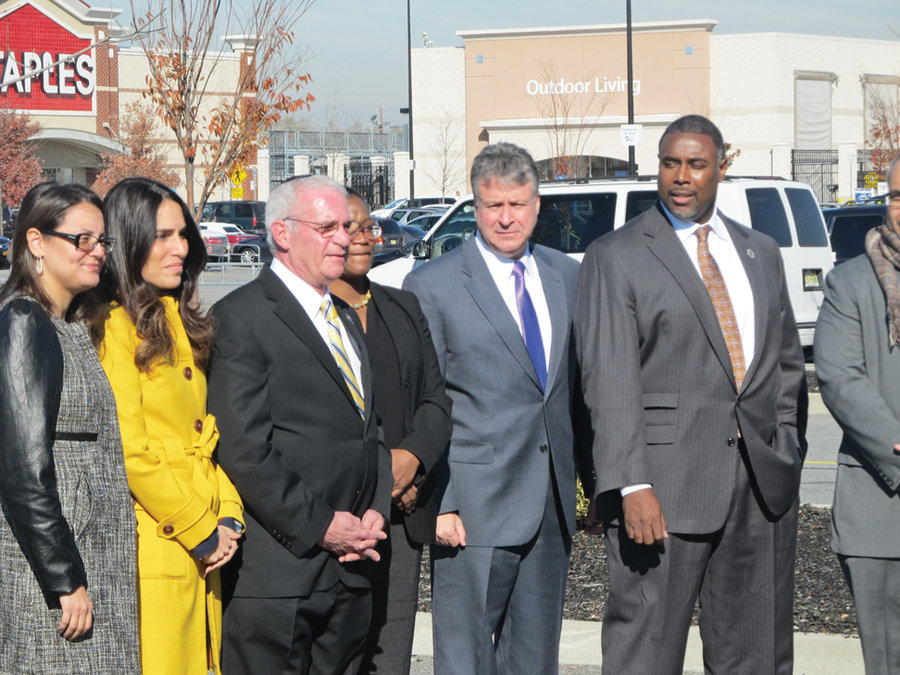Mayors and other urban officials gathered in the Walmart parking lot in North Bergen on Nov. 10 to support a bill proposed by Assembly Speaker Vincent Prieto to reinstate state funds for business districts, or Urban Enterprise Zones.
The bill would mandate that a portion of sales tax revenues go back to some municipalities each year, an estimated $27 million, in an effort to spur urban economic development and reinvigorate the previously highly-successful UEZ program.
The program lowers the sales tax rate to 3.5 percent charged by businesses within UEZ zones. The state then returns a portion back to municipalities to pay for services within those zones, such as street cleaning, police protection, and promotional events.
But in February 2010, Gov. Christopher Christie began to withhold UEZ funds from municipalities to help balance the state budget. At the time, the governor said he intended to revamp the program so that whatever funds were available would be specifically targeted to development, not ancillary services such as police.
Christie wasn’t the first to tap into UEZ funding. Gov. Jon Corzine used some of these funds for his own budget in 2008, but restored full funding the next year, something Christie has yet to do.
The Urban Enterprise Zone Program was enacted by the New Jersey State Legislature in 1983 to help stimulate new economic activity and reduce unemployment within the boundaries of each zone. The establishment of these zones has helped provide incentives for businesses to come to downtown urban areas that have suffered a loss of business to suburban malls, and to occupy vacant properties or build new ones.
The program’s benefits are visible
Hudson County has the most UEZs of any New Jersey county, with zones in Union City and West New York, as well as in North Bergen, Guttenberg, Jersey City, Bayonne, and Kearny. These are among the 37 municipalities statewide which have these zones.
Union City and West New York’s UEZs contain a large concentration of retail and chain stores on Bergenline Avenue, which is the longest commercial avenue in the state and the main commercial strip for North Hudson.
“When he was mayor of West New York, Albio Sires helped rebuild the business district along Bergenline Avenue,” said West New York Mayor Felix Roque. “This has been a boon to our economy.”
There are about 180 UEZ-certified businesses in the main UEZ commercial district in Union City, which entails Bergenline Avenue from 49th to 15th streets, 32nd Street from Bergenline Avenue to Kennedy Boulevard, Summit Avenue from 18th to Fifth streets, and Paterson Plank Road from Fifth to Seventh streets.
Bayonne at its peak has about 213 businesses in its UEZ that runs largely along the Broadway shopping district, but includes areas near the Bayonne Medical Center as well as portions of Avenue C.
West New York’s UEZ covers Bergenline Avenue from 49th to 67th streets, Kennedy Boulevard, 60th Street from Park Avenue to Kennedy Boulevard, and portions of connecting streets. In North Bergen, development of malls along Tonnelle Avenue was a direct result of the UEZ program, said state Senator and North Bergen Mayor Nicholas Sacco.
“This shopping mall we stand near today would not exist if not for UEZ,” he said, noting that UEZ funding offset costs of things such as public safety, and allowed the town to focus on developing thriving malls along a corridor that was previously under utilized industrial.
Jersey City Mayor Steven Fulop said UEZ designation has been a critical element in the redevelopment of Jersey City. More than one third of Jersey City has UEZ designation.
“Jersey City is undergoing a tremendous expansion, with thousands of apartments under construction and new businesses opening every day,” Fulop said. “There is no doubt that the UEZ plays a significant role in our rapid development. Speaker Prieto’s bill is vitally important to Jersey City’s continued success.”
North Jersey mayors show their support
Among the dignitaries that came out to support Prieto’s bill were Sacco, Fulop, Newark Mayor Ras Baraka, Elizabeth Mayor Chris Bollwage, Perth Amboy Mayor Wilda Diaz, Paterson Mayor Joseph Torres, Bayonne Mayor James Davis, Guttenberg Mayor Gerald Drasheff, and others.
“Bayonne is the next development area in Hudson County,” Davis said. “We need the UEZ funds to help jump start our economy. I received more than 400 resumes at City Hall. People need jobs, and jobs are a big part of our economy. We have a $24 million structural deficit in our municipal budget. That means we start out $24 million behind on January 1. The UEZ money will help reduce that.”
“The Urban Enterprise zone initiative is one of our state’s most powerful economic drivers,” said Prieto, “and this legislation would be a strong step toward once again revving the program up and helping our urban areas be more competitive. Our urban areas cannot succeed economically if we do not provide the proper investments into them. The UEZ program is the single best way we can help these cities and their residents and businesses prosper.”
Sacco said the UEZ helped provide clean and safe shopping districts.
“Shoppers simply will not come to an urban area if it is not safe, clean and attractive,” he said. “The UEZ program was one of the most successful economic development initiatives New Jersey has ever pursued, and I am ecstatic to work with Speaker Prieto and my fellow mayors to restore this crucial aspect of it.”
The bill would restore about $27 million to municipal UEZ’s, and while it would not be as restrictive as Christie had envisioned earlier, use of the money would be tied to guidelines issued by the state Department of Community Affairs, Prieto said.
Al Sullivan may be reached at asullivan@hudsonreporter.com.
